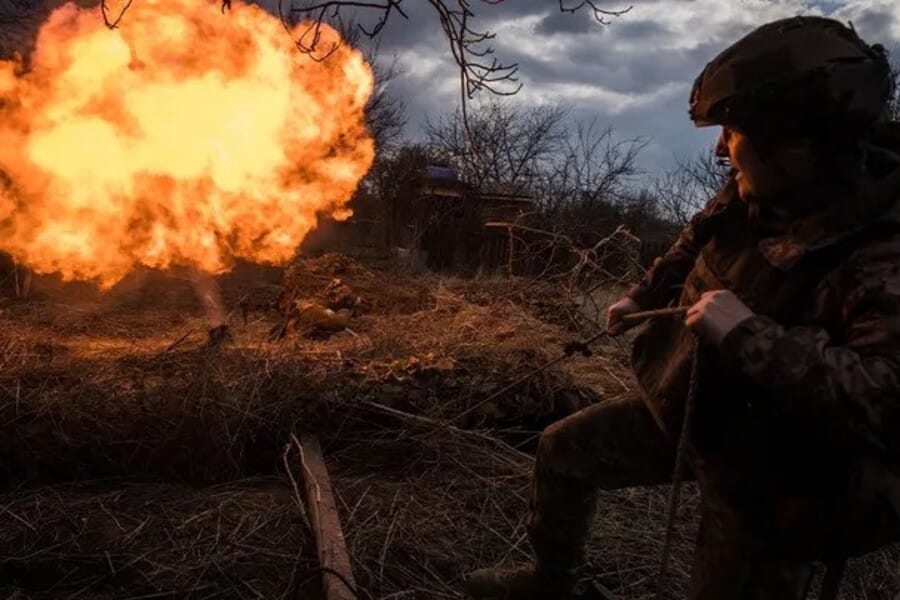
In over two years of conflict, Ukraine’s steadfast resistance against Russian aggression has heavily relied on substantial support from the U.S. and European nations. This coalition has formed the backbone of Ukraine’s defense, providing crucial military aid and ammunition. However, as the war grinds on, this support network is under strain, pushing Ukraine to a pivotal point. Military analysts warn of a severe ammunition shortage that could dramatically weaken Ukraine’s defensive posture.
This looming crisis not only tests the endurance and commitment of Ukraine’s allies but also raises pressing questions about the future trajectory of the conflict. The situation demands urgent attention and action; failure to bolster Ukraine’s defenses could have far-reaching consequences, altering the balance of power in the region and beyond. The challenge is stark, highlighting the critical need for sustained and enhanced support to ensure Ukraine remains resilient in the face of relentless aggression.
The Crux of the Crisis
The heart of the issue lies in the dwindling ammunition supplies, a scenario George Barros, a prominent Russia analyst and leader of the Geospatial Intelligence Team at the Institute for the Study of War, describes as “quite dire.” The protracted nature of the conflict has not only sapped the momentum of Ukrainian forces but has also placed unprecedented pressure on Western allies to maintain a lifeline of military aid. Despite commitments, the specter of aid fatigue looms large, with the U.S. Congress grappling with the challenges of sustaining substantial assistance measures.
The situation is further exacerbated by small yet significant advances by Russian forces, signaling a potential shift in the battlefield dynamics. These gains underscore the urgent need for a recalibration of support to Ukraine, lest it faces the grim prospect of losing ground in a war that has not only regional but global implications.
The Geopolitical Tightrope
The strategic impasse is not just a matter of logistics but a geopolitical tightrope, with Kyiv and its allies sounding the alarm on the broader ambitions of Russian President Vladimir Putin. The fear is that a foothold in Ukraine could embolden further encroachments, challenging the post-Cold War security architecture in Europe. Barros highlights the nuanced burden of military aid, where the U.S. has been the single largest national contributor, yet collectively, European support has surged, notably in defense spending aimed at bolstering Ukraine’s resistance.
This complex web of international support, however, is fraught with challenges. The ramping up of European defense production, essential for sustaining Ukraine’s defensive posture, is a slow-burning fuse. New artillery and ammunition factories, critical for replenishing Ukraine’s arsenal, cannot offset immediate needs due to the inherent delays in becoming fully operational.
A Multi-Faceted Dilemma
Beyond the scarcity of ammunition, Ukraine’s predicament is compounded by the attrition of its air defense capabilities. The degradation of air defense systems, coupled with an aging air force reliant on Soviet-era warplanes, has left a gaping vulnerability. Russian forces, adapting with tactical ingenuity, have exploited this by intensifying attacks on Ukraine’s interior, targeting essential infrastructure with a sophisticated arsenal that includes cruise and hypersonic missiles.
The strategic bombardments, aimed at crippling Ukraine’s logistical and command capabilities, present a dual threat. They not only disrupt the immediate battlefield calculus but also strain Ukraine’s ability to shield its critical infrastructure, forcing agonizing decisions over whether to prioritize front-line defense or the safeguarding of strategic assets.
The Stakes of Air Superiority
Achieving air superiority has emerged as a critical battlefield advantage, especially in the context of the Ukraine conflict. Russia’s evolving tactics and potential for aggressive air campaigns underscore a dire threat to Ukrainian defenses. The risk of Russia adopting strategies akin to those seen in Syria—where carpet bombing inflicted devastating civilian and infrastructural damage—highlights a chilling possibility for Ukraine.
Such tactics would not only signify a profound defeat for Ukrainian defensive efforts but also mark a significant and dark shift towards more destructive and indiscriminate warfare. The implications of losing control of the skies extend beyond immediate military setbacks, threatening to drastically alter the humanitarian landscape and fundamentally change the nature of the conflict.
As the situation stands, the urgency for bolstering Ukraine’s air defense capabilities becomes a paramount concern to prevent such catastrophic outcomes and ensure the preservation of Ukrainian sovereignty and civilian safety.
In the face of these daunting challenges, the resilience of Ukrainian forces, having held their ground for months, is a testament to their determination. However, military experts concur that without a significant and sustained increase in support from the United States and its allies, Ukraine’s ability to maintain its defensive posture is untenable.
The crux of Barros’s warning is clear: the continuation of U.S. support is not merely an act of solidarity but a strategic imperative. The prospect of Ukraine “losing this war” is not just a hypothetical scenario but a looming reality if the flow of critical resupply falters.
The ongoing conflict in Ukraine represents a critical juncture for global stability, challenging the very foundations of international law and the sanctity of national borders. The escalating situation demands more than passive observation; it requires a robust and unified international response.
Amidst the dire circumstances lies a beacon of hope, fueled by the potential for global solidarity and action. This pivotal moment calls for an intensified collective effort to support Ukraine, not just in terms of military aid but as a reaffirmation of our shared commitment to upholding sovereignty, territorial integrity, and human dignity.
By bolstering Ukraine’s defense capabilities, the international community can send a powerful message against aggression, ensuring that the principles of freedom and justice stand firm in the face of attempts to undermine them. The path forward is clear: unity, support, and unwavering resolve are key to navigating this crisis and fostering a future where peace and security prevail.








